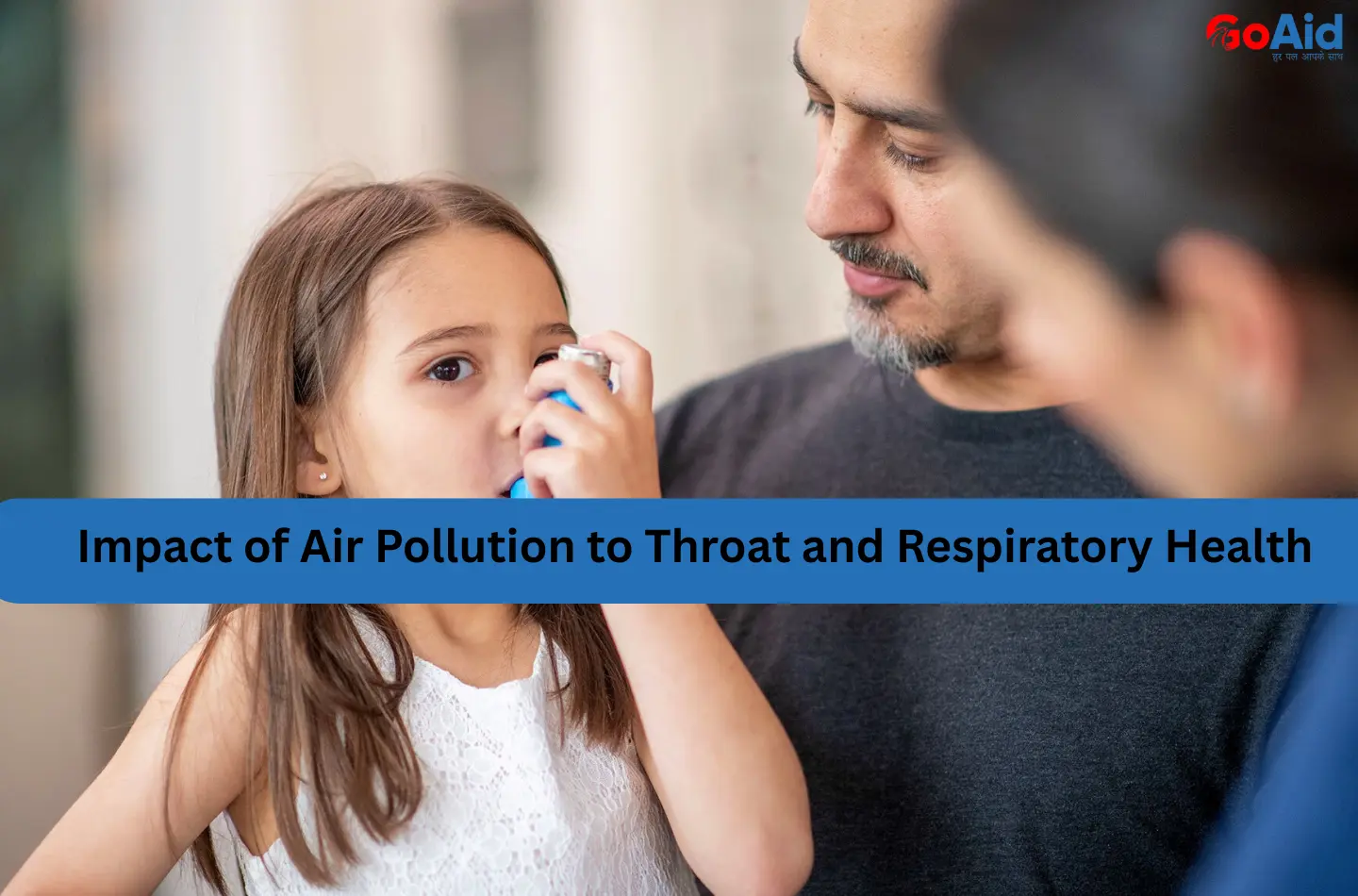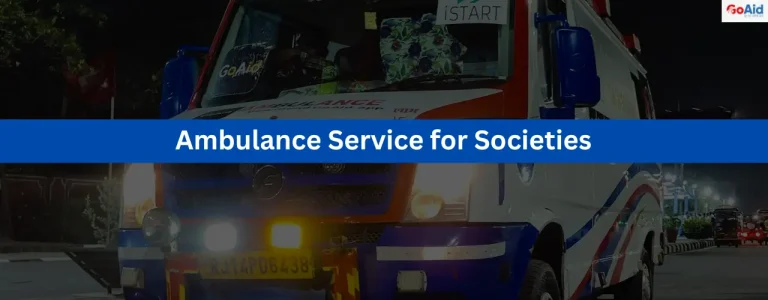With rising air pollution levels across cities, throat and respiratory issues have become increasingly common. Polluted air carries harmful particles, gases, and allergens that can irritate the throat lining. This leads to persistent coughing, soreness, and difficulty in breathing. Prolonged exposure to poor air quality can even cause infections or trigger chronic respiratory conditions.
This is why, in this blog, we have provided you all the details about how air pollution affects your throat, common symptoms, when to call an ambulance, GoAidŌĆÖs role in respiratory emergencies, and preventive tips for maintaining throat health. Are you willing to know about all these points in detail? Then read this blog to the end.
So, letŌĆÖs start ŌĆō
What Happens When Polluted Air Enters Your Throat?
When polluted air enters your throat, microscopic particles, allergens, and harmful gases irritate the sensitive lining. This causes inflammation and discomfort. This can result in a scratchy or sore throat, persistent coughing, and a burning sensation. Continuous exposure may weaken natural defense mechanisms.
This makes the throat more vulnerable to infections. Pollutants like sulfur dioxide and nitrogen dioxide can further aggravate the respiratory system. This leads to chronic irritation and breathing difficulties.
Over time, untreated exposure may escalate to serious respiratory conditions. Professional emergency care, such as GoAid Ambulance services, can provide immediate support to manage severe breathing or throat distress effectively.
What are Common Throat Problems Caused by Air Pollution?
Air pollution can lead to various throat issues, from mild irritation to serious infections. Here are the most common problems caused by polluted air:
- Chronic Sore Throat
Repeated exposure to polluted air causes continuous irritation in the throat lining. This results in persistent soreness that can interfere with daily activities and worsen during periods of high pollution.
- Throat Dryness
Airborne toxins and pollutants reduce natural moisture in the throat. This causes dryness, discomfort while swallowing, and increased vulnerability to infections. Persistent dryness may also lead to a burning sensation.
- Coughing and Throat Clearing
Inhaled irritants trigger the bodyŌĆÖs natural defense. This leads to persistent coughing and frequent throat clearing. This constant irritation can cause fatigue and interfere with sleep and communication.
- Hoarseness or Voice Changes
Pollutants inflame the vocal cords, which may lead to hoarseness, a weak voice, or strained speech. Individuals using their voice frequently may experience prolonged discomfort and vocal fatigue.
- Allergic Reactions
Sensitive individuals may experience allergic reactions from pollutants. This includes throat itching, swelling, and inflammation, which can escalate into respiratory distress if exposure continues without intervention.
- Tonsillitis or Infections
Continuous exposure to airborne bacteria, viruses, and pollutants increases the likelihood of throat infections. This includes tonsillitis, which may require medical attention or antibiotics.
- Swelling and Irritation of the Pharynx
Particulate matter can cause localized swelling in the pharynx. This leads to pain, difficulty swallowing, and a sensation of a lump in the throat that worsens during polluted conditions.
- Increased Mucus Production
The throat produces extra mucus as a defense mechanism to trap pollutants. While protective, this can cause congestion, discomfort, and frequent throat clearing, interfering with normal breathing.
- Acid Reflux Aggravation
Air pollution may exacerbate acid reflux symptoms, irritating the throat lining. This causes burning sensations, chronic cough, and soreness, especially in individuals already prone to GERD.
- Long-term Respiratory Complications
Prolonged exposure can escalate minor throat irritation to chronic respiratory issues. This increases the likelihood of ENT visits, asthma flare-ups, or emergency medical interventions for severe cases.
When Should You Call an Ambulance for Throat or Breathing Issues?
Certain throat or breathing problems require immediate medical attention. You should call an ambulance if you experience severe difficulty breathing, sudden throat swelling, choking, or inability to swallow.
High-Risk Groups:
This includes children, elderly individuals, and those with pre-existing respiratory conditions, should seek urgent help at the first sign of distress. Other warning signs include continuous coughing, wheezing, bluish lips or face, and severe hoarseness.
GoAid Ambulance provides a rapid 10-minute response, trained paramedics, oxygen support, and safe transport to hospitals. This ensures critical intervention before complications escalate. Quick action can save lives during pollution-induced emergencies.
How Does GoAid Ambulance Support for Respiratory Emergencies?
GoAid Ambulance delivers swift, professional support for patients with pollution-related respiratory emergencies. Their diverse fleet includes ICU ventilator ambulances, oxygen-equipped vehicles, and hospital-ready transports for severe cases.┬Ā
Available 24/7, patients can book via the GoAid app or phone. This ensures a 10-minute response. Trained paramedics assess conditions, provide oxygen therapy, monitor vitals, and stabilize patients en route to medical facilities.
It doesnŌĆÖt matter if itŌĆÖs severe allergic reactions, choking, or asthma attacks, GoAid ensures safe, private, and government-approved care. Their interstate coverage and advanced equipment make them a trusted choice for emergency ENT and respiratory services across India.
Preventive Measures for Protecting Your Throat Health
Protecting your throat from air pollution requires conscious preventive measures. Here are 10 effective strategies:
- Wear Protective Masks
Masks like N95 or N99 filter harmful particles from the air. This reduces irritation and protecting your throat and lungs during high pollution periods.
- Use Air Purifiers Indoors
Air purifiers remove dust, pollutants, and allergens indoors, creating a cleaner breathing environment and reducing throat irritation.
- Stay Hydrated
Drinking adequate water keeps the throat moist, easing dryness, irritation, and discomfort caused by polluted air exposure.
- Limit Outdoor Exposure
Avoid outdoor activities during peak pollution hours to minimize contact with harmful particles and reduce strain on your throat and respiratory system.
- Humidify Indoor Air
Using humidifiers maintains optimal moisture in the air. This prevents dryness and soothes irritated throat tissues.
- Practice Nasal and Throat Hygiene
Rinsing with saline solutions flushes out pollutants and allergens. This protects the throat and nasal passages from infections and irritation.
- Consume Anti-Inflammatory Foods
Foods rich in antioxidants and anti-inflammatory compounds, such as fruits, vegetables, and herbs, support throat health and repair irritated tissues.
- Avoid Smoking and Secondhand Smoke
Tobacco smoke exacerbates irritation from pollution. This causes additional throat dryness, inflammation, and long-term respiratory damage.
- Regular ENT Checkups
Frequent medical checkups help detect early signs of pollution-related throat problems. This allows timely treatment before complications develop.
- Monitor Air Quality Alerts
Stay informed about local pollution levels and adjust outdoor activities accordingly to protect your throat and respiratory health.
Home Remedies and Medical Treatments for Pollution-Related Throat Issues
Simple home remedies combined with medical treatments can help manage pollution-induced throat problems.
- Warm Saltwater Gargle
Gargling with warm salt water reduces inflammation, soothes irritation, and helps clear mucus and pollutants from the throat. This provides relief from discomfort.
- Honey and Ginger Tea
Honey coats the throat while ginger offers anti-inflammatory benefits. This reduces soreness, irritation, and coughing caused by pollutants.
- Steam Inhalation
Inhaling steam loosens mucus, eases throat dryness, and clears inhaled irritants. This provides quick relief from pollution-related discomfort.
- Over-the-Counter Pain Relief
OTC medications like acetaminophen help relieve throat pain temporarily. This reduces inflammation and discomfort caused by pollutants.
- Humidified Environment
Using humidifiers maintains air moisture, soothes the throat, and prevents further irritation from dry indoor conditions worsened by pollution.
- Nasal Saline Rinse
Saline rinses cleanse nasal passages and throat, flushing out dust, allergens, and pollutants to minimize irritation and inflammation.
- Avoid Irritants
Stay away from smoke, chemical fumes, and strong perfumes that can worsen throat irritation and respiratory distress.
- Prescription Medications
Severe infections or allergic reactions may require doctor-prescribed antibiotics, antihistamines, or anti-inflammatory drugs to manage symptoms effectively.
- Hydration Therapy
Adequate fluid intake keeps the throat and vocal cords moist. This prevents dryness and helping repair irritated tissues.
- Seek Professional Care
Persistent or severe symptoms should not be ignored. GoAid Ambulance offers rapid, professional emergency support for patients experiencing respiratory or throat distress.
Also Read: How Our 24/7 Call Center Handles Medical Emergency Calls Effectively
Conclusion
In conclusion, we have provided complete details about how air pollution affects your throat and respiratory system. From understanding common problems, recognizing emergency signs, preventive measures, home remedies, and professional support through GoAid Ambulance, this guide equips you to protect your throat health effectively.┬Ā
Awareness, timely action, and proper care are essential to minimize the harmful effects of polluted air and ensure overall respiratory well-being.
















